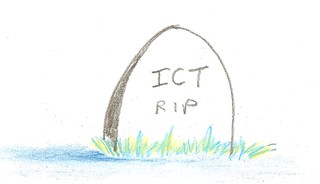 Many years ago there was a television series in Britain called “The Cres”. Short for “The Crescent”, the series followed the day-to-day lives of the fictional residents of a street somewhere in England. Most episodes were engaging and humorous, and made compelling viewing. An article I read this morning reminded me of this, and made me think that a “hyperlocal” blog could work really well for a school.
Many years ago there was a television series in Britain called “The Cres”. Short for “The Crescent”, the series followed the day-to-day lives of the fictional residents of a street somewhere in England. Most episodes were engaging and humorous, and made compelling viewing. An article I read this morning reminded me of this, and made me think that a “hyperlocal” blog could work really well for a school.
3 ways of maintaining privacy
 Her Majesty The Queen of England serves as an inspirational role model in terms of personal privacy. Despite being in the public eye for 60 years, she has managed to keep her personal opinions to herself. Almost nobody knows, for example, what her favourite tea is (although Smokey Earl Grey has been hinted at). Yet there are many people who seem to announce to the world each time they blow their nose!
Her Majesty The Queen of England serves as an inspirational role model in terms of personal privacy. Despite being in the public eye for 60 years, she has managed to keep her personal opinions to herself. Almost nobody knows, for example, what her favourite tea is (although Smokey Earl Grey has been hinted at). Yet there are many people who seem to announce to the world each time they blow their nose!
The balance between public and private is, of course, a personal choice, and one made more difficult by other people openly talking about one’s activities or tagging one’s photos, and much standard business advice. But if you do want to be fairly private while maintaining a strong online presence, here are some suggestions. You may like to share and discuss these with students, who are also striving to get this balance correct.
Comments
Sorry about my lack of response to comments recently. I will rectify that sson. Thanks for being patient.
For some reason, I actually can't respond to comments. I've asked the tech support people to sort it out.
BYOT: the policy that dare not speak its name?
 A couple of months ago Mike Sharples, a researcher at the Open University, told me that he had looked at the websites of some of the schools I was writing up case studies on in connection with their Bring Your Own Technology policy, but was unable to find any references to it whatsoever. He came to the conclusion that:
A couple of months ago Mike Sharples, a researcher at the Open University, told me that he had looked at the websites of some of the schools I was writing up case studies on in connection with their Bring Your Own Technology policy, but was unable to find any references to it whatsoever. He came to the conclusion that:
BYOT is the policy that dare not speak its name.
I have to say that although there are quite a few schools adopting a BYOT approach, finding them has not been easy.
12 ways of disconnecting in a connected world
How can one disconnect in today’s world, and why would one want to anyway?
Read MoreBring your own thinking
 A few years ago I said to one of my team, having been in the new management post for about a week, “How come nobody here ever takes a decision? How come they always ask me what they should do, especially when they know more about their specialist area than I do?”
A few years ago I said to one of my team, having been in the new management post for about a week, “How come nobody here ever takes a decision? How come they always ask me what they should do, especially when they know more about their specialist area than I do?”
“Because”, came the reply, “Our last boss always had an opinion on everything, and stuck to it whatever anyone else suggested. So we very soon learnt that there was no point in doing any of the thinking for ourselves.”
Are links in blogs always a good thing?
 I know it’s de rigeur to always include links in blog posts: it’s polite, gets you Brownie points with other people, provides a rich and rewarding reading experience, and generally helps make the blogging world go round.
I know it’s de rigeur to always include links in blog posts: it’s polite, gets you Brownie points with other people, provides a rich and rewarding reading experience, and generally helps make the blogging world go round.
But is always right?
An example of how technology changes things
 I have found the Never Seconds debacle quite interesting. Story in a nutshell, in case you missed it: nine-year-old Martha Payne writes a daily blog in which she uploads a picture of her school lunch and reviews it. Argylle and Bute Council has some sort of nervous breakdown and issues an edict telling Martha that she isn’t allowed to take photos of her lunch, because catering staff are now in fear of their jobs. As a consequence, Martha’s blog gets over 5 million page views in just a few days, the number of comments on her posts soars from around 30 to over 2,300 in two days, and Argyll and Bute rescind the ban.
I have found the Never Seconds debacle quite interesting. Story in a nutshell, in case you missed it: nine-year-old Martha Payne writes a daily blog in which she uploads a picture of her school lunch and reviews it. Argylle and Bute Council has some sort of nervous breakdown and issues an edict telling Martha that she isn’t allowed to take photos of her lunch, because catering staff are now in fear of their jobs. As a consequence, Martha’s blog gets over 5 million page views in just a few days, the number of comments on her posts soars from around 30 to over 2,300 in two days, and Argyll and Bute rescind the ban.
“I’m on the tube!”
 People travelling on the London Underground (known as ‘the tube’) will soon be able to obtain a wi-fi signal on their phone or other electronic device.
People travelling on the London Underground (known as ‘the tube’) will soon be able to obtain a wi-fi signal on their phone or other electronic device.
What might be the benefits and costs of this?
Interesting times in ICT
 The phrase “May you live in interesting times” is usually cited as a sort of curse, but can you imagine the opposite, ie living in boring times? Fortunately, especially here in England there is no danger of that for a while, at least in the world of ICT. Here are a few snippets of news which I won’t comment on at the moment because I like to cogitate, reflect, and then cogitate some more before pontificating. As I said in a previous article (10 Obligations of Bloggers), quoting Salvator Rosa, I believe in the adage “Be silent, unless what you have to say is better than silence”.
The phrase “May you live in interesting times” is usually cited as a sort of curse, but can you imagine the opposite, ie living in boring times? Fortunately, especially here in England there is no danger of that for a while, at least in the world of ICT. Here are a few snippets of news which I won’t comment on at the moment because I like to cogitate, reflect, and then cogitate some more before pontificating. As I said in a previous article (10 Obligations of Bloggers), quoting Salvator Rosa, I believe in the adage “Be silent, unless what you have to say is better than silence”.
Old technology
3 reasons to have trainee teachers, and how to manage them
 You’d think that you could get the best results (however measured) by having only experienced staff to teach ICT, and that managing a trainee teacher would be a diversion. But my experience, as well as a consideration of principles, suggests to me that such a view is mistaken.
You’d think that you could get the best results (however measured) by having only experienced staff to teach ICT, and that managing a trainee teacher would be a diversion. But my experience, as well as a consideration of principles, suggests to me that such a view is mistaken.
ICT Professional Development News
 Here are a couple of items that have come to my attention, and which I hope will be of interest. One is a conference, which takes place on 7th June, the other is access to web resources, on a special offer.
Here are a couple of items that have come to my attention, and which I hope will be of interest. One is a conference, which takes place on 7th June, the other is access to web resources, on a special offer.
Mobile phones in education revisited
![]() The most popular article on the ICT in Education website is one by a 17 year-old student called The Importance Of Mobile Phones In Education. To give you an idea of its popularity, I would estimate that it has been viewed at least 30,000 times since it was published back in July 2010. So the question is, why is it so popular?
The most popular article on the ICT in Education website is one by a 17 year-old student called The Importance Of Mobile Phones In Education. To give you an idea of its popularity, I would estimate that it has been viewed at least 30,000 times since it was published back in July 2010. So the question is, why is it so popular?
Is it because it was written by a student? Well, there is no doubt that student articles receive a lot of attention, but not usually this much.
Is it because it is about mobile phones? I don’t think so: I have written about mobile phones before, and again, the articles haven’t attracted 30,000 views as far as I know.
I think the answer lies in the combination: an article about mobile phones written by a student who appears to be surgically attached to one.
Computer programming and the trouble with collective nostalgia
 Lord Puttnam said something every interesting at an E-Learning Foundation Conference. Having been a film producer, he said that up to about ten years ago, to be a successful cinematographer you had to be able to take a camera apart and put it together. Now, none of those sort of skills are required: you need a whole different set of skills in order to find employment in that occupation.
Lord Puttnam said something every interesting at an E-Learning Foundation Conference. Having been a film producer, he said that up to about ten years ago, to be a successful cinematographer you had to be able to take a camera apart and put it together. Now, none of those sort of skills are required: you need a whole different set of skills in order to find employment in that occupation.
I believe a similar thing is true in the realm of “digital education”. Almost nobody needs a gasp of computer programming, and even fewer need to know how computers actually work.
What is the appropriate form of address in email?
 Here is the text of a note from the Post Office, quoted in “Berry and Co”, which was written by Dornford Yates and published in 1920:
Here is the text of a note from the Post Office, quoted in “Berry and Co”, which was written by Dornford Yates and published in 1920:
Sir
I beg leave to inform you that your telegram handed in at the Grosvenor Street Post Office at 10.2 am on the 26th June addressed to Reply paid Hamilton Smythe Fair Lawns Torquay has not been delivered for the reason indicated below.
ADDRESS NOT KNOWN
I am, Sir, Your obedient servant,
WB
Postmaster
The joy of not knowing
 What teachers and other educators do best is, by and large, tell people stuff. It can be unsettling to not know things, so it’s no doubt natural to assume that if we don’t like it, then neither will others. So we tell people. But is it OK to not know the answers if you’re an ICT teacher? Here are a few thoughts about that, followed by a video featuring Kate Russell.
What teachers and other educators do best is, by and large, tell people stuff. It can be unsettling to not know things, so it’s no doubt natural to assume that if we don’t like it, then neither will others. So we tell people. But is it OK to not know the answers if you’re an ICT teacher? Here are a few thoughts about that, followed by a video featuring Kate Russell.
Some notes on failing with ICT
 Failure seems to be the zeitgeist at the moment. At several conferences I’ve attended recently at least one of the presenters has displayed the Samuel Beckett quotation:
Failure seems to be the zeitgeist at the moment. At several conferences I’ve attended recently at least one of the presenters has displayed the Samuel Beckett quotation:
Ever tried. Ever failed. No matter. Try Again. Fail again. Fail better.
At the Pelecon 12 conference there was even a “Confessional”, in which delegates could go in and record themselves talking about one of their mistakes. Here are a few of my thoughts on failure, especially as it pertains to ICT.
